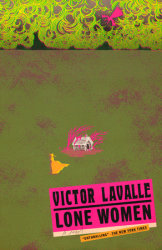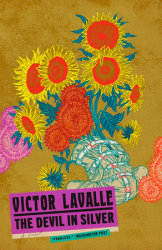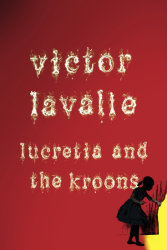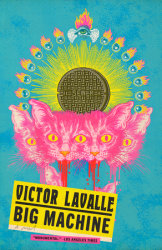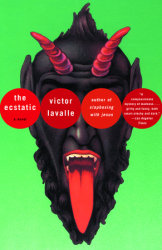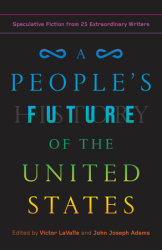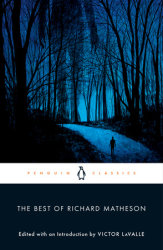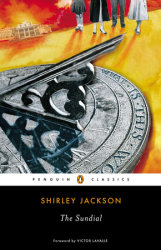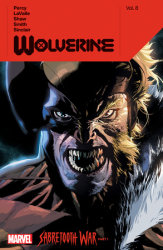Victor LaValle writes literary fiction that will leave you as scared as a kitten. You’ll tell yourself that you’re only going to read a few pages before you go to bed, but when you glance over at the clock, you realize that you’ve been reading for hours: too scared to stop and try to go to sleep, but so engrossed that you keep saying “one more chapter” until. Well, now look at you. Dawn is on its way.
LaValle’s fiction, which has explored themes of madness, monsters, and music, in books such as The Ballad of Black Tom, The Devil in Silver, and Slapboxing with Jesus, has garnered LaValle critical praise that has resulted in Nebula and Hugo Award finalist nominations, a Guggenheim fellowship, the Shirley Jackson Award for Best Novel, an American Book Award, and, in 2004, he was named as a recipient of the prestigious Whiting Award, which recognizes young writers of exceptional talent.
LaValle’s newest novel, The Changeling, is difficult to describe because of the danger of giving away spoilers, but, as a means of my own testimony of how much I enjoyed the book, I read the book cover-to-cover in one day, most of it spent with that jittery sense of excitement and dread that I used to feel as a kid when the roller coaster car was climbing the steep incline. The writing actually caused me to hold my breath anticipating the incipient disaster about to befall the happy family LaValle creates: professional book collector Apollo Kagwe, son of a Ugandan mother and white father; his wife, Emma, who works as a librarian; and their baby, Brian, the infant son with whom both parents are besotted. And then something goes horrifically wrong.
At this point, LaValle takes readers on a trip through New York City and environs in the re-creation of a fairy tale in which the internet, feminism, “new fatherhood,” the boroughs of Queens and Manhattan, and the islands of New York all play a part. And, because both Apollo and Emma are book people, literature – namely a lesser known work of Maurice Sendak – plays a huge role in the story.
I recently spoke on the phone with LaValle. It was one of the first interviews he has done in support of The Changeling’s release, and so both of us were trying to find ways to talk about the plot of the book without giving anything away. There are no spoilers in this interview.
PENGUIN RANDOM HOUSE:I couldn’t stop reading this book. I was blown away. Not to dis any of your previous work, but I think this may be the best thing you’ve ever written.
VICTOR LAVALLE: (laughing) How could that be a bad thing? It’s the most recent thing. That’s only bad when it’s the first thing.
PRH:The book is so deep, and I hate to say it but there was some stuff that I should have been able to figure out earlier in the book that I didn’t figure out until later.
VL: That’s good to know, because I was afraid that some things would be too on the nose.
PRH:You did a really great job of distracting me from noticing clues. I have to tell you something really kind of crazy though. I posted on Facebook that I had read your book and I recommended it without giving anything away. And then I went back to my email. And then, I’m not kidding, five seconds later, I got an email from Norwegian Airlines.
VL: Oh, that’s creepy.
PRH:I found myself wondering if someone mentions your name online, is Norwegian Airlines going to buzz them?
VL: I feel, in the spirit of the book, I should get a cut. They shouldn’t make all the money off that. Although it’s not the most positive light on Norwegians. Maybe they’ll cancel that algorithm.
PRH:I was wondering why you picked the Norwegians as your bad guys for this book.
VL: I feel like I’m mildly obsessed with calling out the groups who perhaps slip under the radar. So in a previous book I called out the Dutch. The Dutch began European colonialism. Britain. Spain. Belgium. Germany. They get all the shit blown at them, and the Dutch just keep their mouths shut. “We’re just walking along, being very tall. Don’t talk to us.” After living in the Netherlands for a little bit, I want to say, “You’re a part of all of this but somehow you slip out of the conversation.” And it seems troubling to me, partly because everyone who is involved should be included. But in a weird sort of way I really hate it when people get away with a thing and are smug about getting away with it.
PRH:Absolutely. And the Dutch gave us South Africa.
VL: That’s right. I was thinking it would be the Swiss, but the Norwegians seemed like scarier people. The history of the actual Sloopers was just sort of a nice find historically, and so here’s the story of the foundation myth.
PRH: Let’s talk about Maurice Sendak. Did this book start with Maurice Sendak? Is he the origin of this?
VL: Well, really it was that my wife had a copy of Outside, Over There that her parents used to read to her as a kid. We still have it. And it’s signed by Maurice Sendak. It’s just a very special book.
When our son was born, our first kid, she said, “Someday, you’re going to want to read this” because she knew that I also like scary stories. I had never read it. And then I was reading it, basically in preparation to read to him and I was like, “What the – this book is insane! This book is terrifying.” But I understand, even plot-wise it doesn’t make sense, there’s not necessarily A-B-C steps to it. But on an intuitive or emotional level, every image makes sense. And that really struck me. And then, when our son was old enough, I did read it to him and he loved it in part because it was so scary. That was a real lesson for me. In a lot of horror there’s the trope that kids can see monsters and adults can’t because adults forget what it’s like to be a kid. That’s a very old trope. What struck me was that you also forget when you become an adult that kids like monsters.
When I was a kid, one of my favorite monsters was Darth Vader. My kids, one of their favorite characters is Kylo Ren. They could give a damn about anybody else and I didn’t care about Han Solo, Luke Skywalker, Princess Leia. I kind of liked Chewbacca, but other than that, I didn’t care about any of them.
When you go to Comic Con, people comment on how many kids run to hug Kylo Ren. I think it’s not a small thing, that appeal.
PRH:I read the Sendak this morning in preparation for talking to you, and the pictures are gorgeous. I was thinking that the child is being read something but they’re doing it within the enclosure of a parent’s arms reading it to them. Do you think there’s something to the idea that the horror is mitigated by being protected by the parent, and it’s part of what makes that horror exciting for kids? The parent is there to keep them from the real danger. Or do you think they are genuinely scared that the bad thing would happen to them?
VL: I don’t think there’s any kid who actually wants real-world horror. I’ve never heard of kids facing real trauma and laughing about it. So I think you’re right about that.
I think for a kid, the levels of surprise, terror, and potential danger are very real. I’ve come to now understand that when they’re saying, “I’m scared of the dark,” it’s not that they’re making it up. They really are scared of something and the fact that it’s not there doesn’t mean anything. It’s a real fear for them. So those big monsters or real terrors feel a lot closer to how they feel at certain parts of the day, whether it’s going to bed at night in the dark. Even in school, sometimes my son will say, “Everything just got too loud, and I really wish I could just go in a corner and be away from everyone.” Thankfully, the teachers will let him do that but that’s a pretty new thing. When I was a kid, if I had said, “Everything’s too loud,” the teacher would have said, “Well, why don’t you shut up?” And that would have been the end of it. So I think those feelings really are that big and monsters approximate that level of feeling.
Kylo Ren is really just a big kid, but the dude is having big tantrums and can kill people just by waving his hands and that seems cool when you’re a kid. And you wish you could do that sometimes.
PRH: And what kid hasn’t wished their parents to go away or be dead?
VL: So many great kids’ books are: page one, the parents died. When you go to the library for group read and the librarian will read a story and the parents will die in some way, the only people who are hurt by it are the parents. The kids say, “Yep. Now tell me more.”
PRH:Are you finding that increasingly parents are wanting to censor those kinds of stories because they’re too scary? I say this because my partner has two small grandsons and we’ve tried to send them stories that we both read to our kids when they were little kids and his daughter says, “No. Those are too scary for the boys.” And our response is, “These are the stories we read to you as kids.”
VL: My mother-in-law was a school librarian and I remember her talking to us. My wife (writer Emily Raboteau) talks about books we want to give as gifts or even want to write someday as children’s books, but my mother-in-law tells us that books where the parents die are not the books that parents will buy for their kids. It was really like a sad moment. I feel like we should have to name a series, “Kids: Steal This Book” or “Kids: Steal Your Parent’s Wallet and Buy This Book” because it’s the parents who don’t want it.
PRH:How did we read all those books when we were kids?
VL: Benign negligence.
PRH:In the book you talk about how Apollo reads all these books when he’s coming up and there’s nobody there to tell him not to read those books, which was my experience. I remember the only time my father ever intervened was when, as an eleven- or twelve-year old, I brought home The Godfather from the library. And my dad flipped through the pages, found the sex scene about twenty pages in and said, “I don’t think this is appropriate for you.” But that was the only time in my life my parents ever took a book away from me. The rest of the time, they had no idea what was in the pages. I wanted to say to my dad, “I’ve been reading this stuff for ages, Dad.”
VL: Judy Blume already blew the doors off. (laughing) I remember that we used to read that in the library. A bunch of kids would sneak away with Forever and read the sex passages. It was a book that the librarians wouldn’t let us take out, so we’d just sit in the back and read it, and say, “Ohhh. Wowww.” So, obviously, they should ban all libraries.
PRH:That’s a nice segue to talk about the book. I was reading the part about “New Dads” and I was feeling really warm about it. Some really good friends of ours just had their first baby a few days ago, and as you would expect, at the moment there are about 6,000 photos of the baby on Facebook already. After reading your book, I’m resisting the urge to contact him to tell him to take all those photos down.
VL: (laughing) It won’t work. That’s the thing. I still post photos of our kid, and I wrote that book. It’s like an addiction.
PRH:One of the things that comes through is that this fierce, intense, “I would die for my child” kind of love that I think most of us feel when our children are born – somehow it seems to have mutated into a cloying protectiveness of children. One of the things your book does is it shows parents that unless you stay twenty-four hours a day with eyes on your child, you can’t protect them. Do you want to talk about parental fear? Is this a book about parental fear? Is this a way for you to talk about your own parental fears?
VL: I would say I hoped that I was showing what was beautiful about the much more involved and attentive parenting of both mothers and fathers. But on the cautionary end of things, at a certain point, you can’t live, you can’t raise your children to be scared of life. I remember when I was a kid, we had one friend who, when we would go out on a Saturday morning, everyone had to be home by the time the sun went down. But this one kid, he would have to call his mother once an hour and let her know he was okay. So he was always walking around with, like, pockets full of dimes and nickels because he had to call. If he didn’t call his mom would be a wreck and he would be in a lot of trouble. I remember he was such an anomaly and it was bizarre. Our kid isn’t old enough yet, but with cell phones, the idea that he has a cell phone, I need you to call me a couple times a day doesn’t seem so implausible anymore.
PRH:It’s really bad. When I was teaching college, I had college students who would tell me that if they didn’t call their mothers once a day from school, from college, their mothers would assume that something bad had happened to them and they would get in trouble. So the cell phone had become another form of childhood harness.
A few years back, Zadie Smith wrote an essay for the New York Review of Books about Facebook and the internet in which she argued that the language of Facebook would eventually teach us how to have relationships with other people, that the idea of “liking” something or reacting to something, that we would learn things from the social cues that are given to us on Facebook. It’s not giving too much away to say that there are parts of your book that deal with the internet. You were born in the early 1970s so you have seen the internet happen in your lifetime and all these changes. Do you see the internet changing the way people relate to one another?
VL: I’m not a big believer that human beings change all that much. Every year or so, someone passes around a site: “Here are letters that were written home from the Civil War.” And they’re like these sweeping, beautiful pieces of literature, something you’d be proud to write yourself as a writer. But I always wonder what percentage of the entire army was writing like this? My belief is that, for the most part, human beings adapt to a technology, whether that technology is letter writing or the internet or religion or science and then corrupt it. I don’t think it’s the thing that changes us. At our worst, I think we just take whatever’s new and degrade it so that the monkeys that we are can use it, so our monkey brains can still use it. The vast majority of us most of the time use almost anything and everything for selfish nonsense. That’s certainly been the case for religion, and it’s the case for the internet. Obviously, I could be wrong. Maybe there’s a different way to talk about this. I can’t think of any people who would claim that the comment section has changed. That’s easily a mob. Whether it’s fifty years ago, 150 years ago – Neanderthals when they were just learning language.
PRH:The internet isn’t causing new behaviors to erupt. It’s just making sure that we see that those behaviors were always there but now they’re just in our face every single day.
VL: Absolutely. I agree totally.
PRH:I sometimes wish that I didn’t know that men spoke like that. I don’t even read comments anymore. There’s no point. They are exhausting. It’s a shame because an interesting thing is published and you want to have a discussion about it and how long does it take before someone comes along and trolls the conversation?
VL: I get annoyed by the trolls, but I still hold a special hate for four comments down, the “I made a lot of money on the internet doing this …” which is much more benign in its way but that kind of bot. You know, I see some trolls and I think, “Oh. Just some angry dude.” I can set him aside but the bots are always more pernicious because you delete them and they’re like, okay, there are eight more of me.
PRH:And it turns out that most of our president’s followers are bots. Speaking of which, do you think our president is our first internet president? Is he the president that the internet mob has elected?
VL: Well, the internet elected Obama.
PRH:That’s true. It did.
VL: So I think Obama was probably the first internet president. I was kind of fascinated with reading articles about the group who figured out using Facebook, essentially just Facebook data, to figure out how many pockets of people there were who they could persuade. And then realizing that the game was just about getting about forty percent of that, that’s all they needed. I thought that was pretty interesting even as I was despairing about what the result had been.
Obviously, I’m biased. But I think Obama was the first internet president and Trump was the first “comments” president.
PRH: That’s fantastic. “The Comments President.” What do you make of the fact that we are witnessing his complete decompensation on Twitter?
VL: I think it’s fascinating. Pretty much everyone he brings on board is riddled with corruption and incompetence, actual purposeful hatred. I’m also interested in the way, on the other end of it, I didn’t realize how much faith I had in the democratic American system as a sort of story until this dude came along. I don’t believe he’ll be impeached. I don’t believe he’ll do anything to push things far enough to cause Congress to even begin the process. The only thing that’s going to happen in 2018, I hope, is things sway on the congressional end. He’s already failing on many of his broadest sweeping programs. There is that groundswell to cut him off at the knees until 2020. I just don’t have any faith systematically that a guy like that is going to get knocked down. Do you remember David Blaine? When David Blaine was standing up on the platform five stories above the street and everyone said, “Oh my god, if he loses his balance, he’s going to fall and die.” No. He had a pole up there that was attached to him. He never could have fallen. The most that would have happened is that he would have hooked a little bit. That’s Trump in our current system.
PRH:I’ve been really disappointed because I had hoped that people would see his behavior and they would rally within sixty days and the guy would be impeached and we’d be done with him. And it hasn’t happened.
VL: I’m sure it’s not the first time that it’s come up, but there was a piece that some people were passing around yesterday that showed that only twenty-five percent of Trump’s supporters were white working class. All the rest are middle class and upper class white. Those folks have a lot of money. And a lot of power. They have a vested interest in him not falling. The stock market seems to be doing good so the investments that they have are doing well and I don’t think people realized that was who is keeping him in power. And those people vote and call up their congressional leaders and that’s a pretty unshakeable base for a little while longer.
PRH:Nothing made me more furious than the mythology that it was this angry white working class that put him in power. I was raised by working people who voted for people who wanted to make things easier for working people, not harder, and that’s what would happen if working people voted for Trump.
I want to talk to you about the profession that you give to your main character, Apollo, which is book collecting. It’s a fantastic profession. I wrote an article about bibliomania and it turned out that there are apparently millions of people in the world who are bibliomaniacs because they all wrote to me to tell me about it. Is this one of your own vices? Are you a bibliomaniac?
VL: I would be if I had a bigger apartment (laughs) so it’s not possible. But the reason for that whole part of the novel is that I worked for a rare and used book dealer on and off for about two years. And I really loved the business. It was a very small business, just two guys, and I came on doing clerical work. It was the early 2000s, so they were just moving their stock to start listing things on the internet because people all over the country or the world might be looking for their stuff now. And they didn’t have to stay a local concern. I could type quickly because I was a writer. I was happy to sit quietly in a windowless room with them. And as a result, I got to watch the inner workings of the business. I was already a book lover. I loved reading and having books but it was great to see the inner workings. But like anything, the inner workings, how things actually run, is infinitely less romantic than you think.
It popped one balloon because I had sort of thought that the used and rare booksellers must be sitting back here talking about the amazing content of the books. And they must have read everything. And then I started working with them and I would say a good portion – sixty percent – of the business was “that book was about what?” I just remembered it was “near fine” quality and none of the pages were rubbed. It was just work. But I came to love that, too, because for you this thing is just work and it doesn’t really matter because the person who gets it is the person who loves that book.
With Apollo, I wanted to have a character who was a reader, you know that from a young age he had loved reading and he really did love books, and then to see the moments where he thought, “Okay. How can I cheat this old lady out of this book for money, and how can I justify it because I got a kid to feed?” Falling into these traps of work-a-day life. That was the real impetus, those two years working for these guys.
PRH:And one of the horror elements of your book is what befalls the prized book that they come into possession of.
VL: You know, what’s funny about that is that for the longest time, I couldn’t bring myself to think about how to have anything happen to that book. Because the idea of such a book ever existing was so beautiful to me. And then finally my readers – my editors, my best friend, my wife – one after another they asked me, “Does this guy care or would he know that it would hurt you if you did something to the book?” and I said, “He would know that this is the last dagger.” So they said, “ruin that book.” And it was so hard.
PRH: So you probably know this story already, but there was this rumor when I was at Cornell about the rare book room at Yale, in the Beinecke Library. I don’t know if this is apocryphal or if it is true (according to the link, this is myth) but supposedly, if a fire ever breaks out, all of the oxygen will be sucked out of the library to put the fire out immediately and if there are people down there, they will die. Because the decision has been made that the books are more valuable than human life. At first I was horrified by that, but when I was reading your book, I thought it was more horrifying than reading about a murder. (laughing)
VL: That’s the proof of the bibliophile. (laughing)
PRH:It’s a sad thing.
VL: But when you were describing it, I was thinking, well, if it was at night, and nobody was there.
PRH:You start negotiating. Is it one or two people? Or is it a whole library full?
PRH:Okay. Getting back to the book. Is there some kind of monument in Forest Hills, Queens, that you found when you were walking around the woods there? In the book, you said there’s a plaque.
VL: I didn’t discover something like that, but I’m only going to say that I may have left something like that. There’s a part of me that thought, vainly, ten years from now, somebody’s going to be stumbling through those woods, having a day and they’re going to stumble across it and it’s going to freak the hell out of them. And it’s going to make me so happy.








